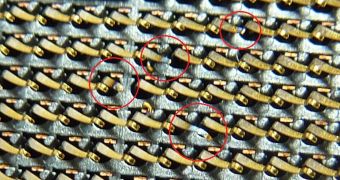Last week, the first reports about LGA 1155 suffering from the socket-burn syndrome made their way onto the web after a hardware review website got a Gigabyte Sandy Bridge motherboard that exhibited clear symptoms of that problem, but, it seems like these worries are unfounded as the Taiwanese company says that no such issue plagues LGA 1155 boards.
According to Gigabyte's US team, the TechReaction website received two boards, a brand new GA-P67A-UD7 and an open box GA-P67A-UD4.
The latter of these two motherboards was the one with the damaged socket, and Gigabye says this was already a faulty component before it was send out for testing.
“We suspect that we messed up and sent him a board that we had damaged during our own testing and have sent him another new one,” claims the company.
“Our testing involves overclocking and other various tests to which no motherboard should normally be exposed – we’re basically testing durability, and durability is determined when the board dies.
“We’re still waiting to check the board and trace where it has been, to try and figure out how a damaged board was sent as a media sample and prevent this from happening again,” reads the company's response.
The issue was uncovered during the early days of LGA 1156 motherboards, when AnandTech uncovered that under extreme overclocking conditions the socket could burn, damaging the CPU in the process.
Most of the problems were recorded by motherboards that used Foxconn sockets, as they didn't provide enough pressure so that all the pins could properly make contact with the pad in the chips VCC/VSS area.
As a result, when a high Vcore was used, the processor would draw a vast amount of power through only a small part of the pins, causing the socket to burn.
Fortunately, Gigabyte says there are no reports of retail LGA 1155 boards exhibiting the same problems. (via Bit-Tech)

 14 DAY TRIAL //
14 DAY TRIAL //